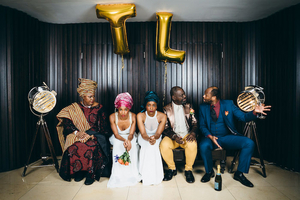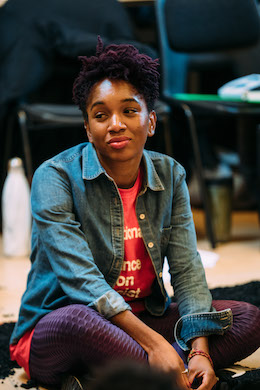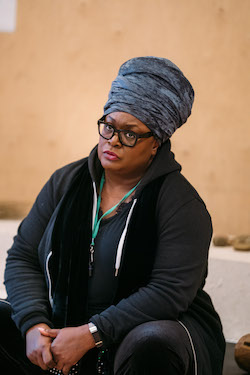Guest Blog: Playwright Temi Wilkey On THE HIGH TABLE

When the artistic team at the Bush told me that they were interested in programming my play, I genuinely couldn't believe it. Not only because I'm a first-time writer, but also because when you write a play about a queer British-Nigerian woman, you don't really expect it to be programmed. My plan was to get this first play off of my chest and then quickly move onto the next.
With this next (hypothetical) play, I'd be much more tactically minded. More pragmatic. I'd create it with a deliberate eye towards it getting staged. Which, of course, would mean limiting factors that theatres (who might eventually be interested in programming it) might see as risky. I saw The High Table as the play that I needed to write. The one I'd get out of the way, that might never see the light of day. Or...that might one day be staged, in the distant future, if I ever managed to make a name for myself as a playwright!
I'm really happy I didn't have to wait that long to see this play staged. And while I retain the belief that it's important to be pragmatic and have low expectations - because you're more likely to be pleasantly surprised than incredibly disappointed - I also think it's really important to interrogate why I thought this way and explore the perceived unlikelihood of this black queer play being programmed.

This unlikelihood stems from a systemic bias towards what Grayson Perry called 'The Default Man'. The Default Man is straight, white, able-bodied and middle class, and the further a play is from centring this kind of character, the more risky it's perceived to be.
So, for example, centring a woman's story is possible, but they would ideally still be straight, white, able-bodied and middle class. With the Default Man in mind, my play poses a triple threat, as it follows the story of a woman who is both Black and queer.
As Bridget Minamore noted in a recent article for the Guardian, there's been an incredible boom in Black theatre in the UK over the past 10 years. But when she spoke to Winsome Pinnock, they noted that when you look closer, there are not that many plays staged by Black British playwrights. Most of the plays that are staged by Black writers are American.
So it is still relatively difficult to get your work staged as a Black British writer. Though incredible debuts from both Yasmin Joseph with J'Ouvert and Jasmine Lee-Jones with seven methods of killing kylie jenner last year might have made enough waves to begin to change the tide on this.
When we look at the queer plays that are staged in UK, we can see the same issue arise again. When queer plays are staged, their protagonists are predominately very close to the Default Man. Though they are queer, they're very likely to be white, male and middle class. For example, The Inheritance and Angels in America.
Fun Home is a rare story about a queer woman, which had its UK premiere at the Young Vic in 2017, and it's had a huge influence on the writing of The High Table. But, again, all of these notable queer shows on main stages are imported from America. I can't remember ever seeing a queer story by a British writer on a major UK stage.

Perhaps this might be beginning to change because of incredible work from writers like Zoe Cooper, whose beautiful play Out of Water was on at the Orange Tree last year and centred a queer female relationship, or John King's magical debut, Eris, which was staged at the Bunker in 2018.
The past couple of years have provided great encouragement for incredible work by Black British playwrights and queer British playwrights. But there's not a huge precedent to look to when it comes to main stages. So I think I can be forgiven for my low expectations. Especially when Blackness and queerness are combined into a large-scale play centring a woman's story by a British playwright. No chance, I thought.
However, thanks to the artistic directorship of Lynette Linton, in what has been called "The most daring season" in London, and a co-production with Birmingham Rep, my play will be seen in not one but two cities!
Recently, we've seen a shift in the UK theatre ecology, with more women and more Black and Asian artistic directors, as well as other executive positions of power. It's only the beginning, but it means that there's hope - that writers don't have to feel like they have to write tactically or appeal to 'The Default Man'.
I'm hopeful that this is encouraging writers to feel like they have license to write what they want to write and believe that their play has a chance of being staged. That this systemic bias is slowly being challenged and their plays do not have to live in the drawer and could one day see the light of day.
The High Table at Bush Theatre 8 February-21 March, and at Birmingham Rep 25 March-9 April
Photo credit: Helen Murray
Comments
Videos

